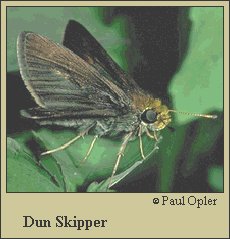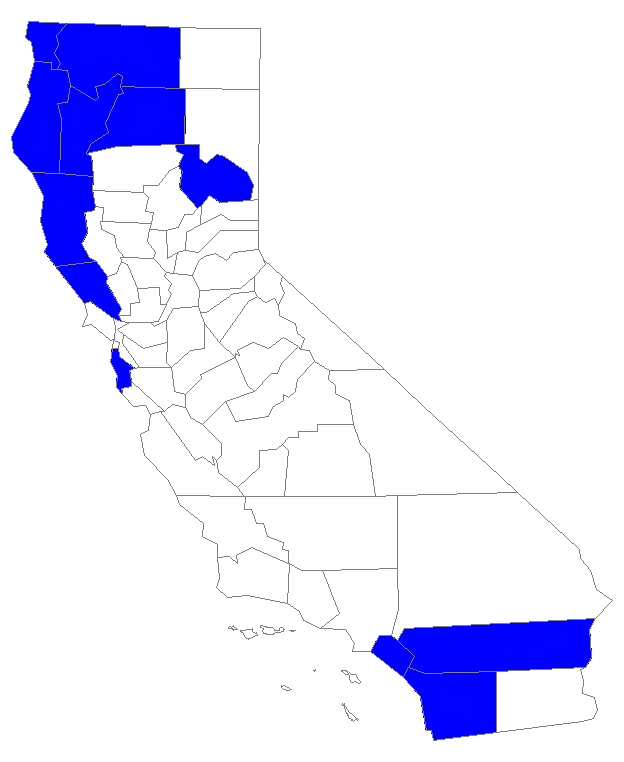 |
 

 |



Dun Skipper (Euphyes vestris [Boisduval])
Wing span: 1 1/8 - 1 3/8 inches (2.9 - 3.5 cm).
Identification: Upperside of head and thorax is yellow-orange. Wings are brown-black; male forewing has a black stigma, female forewing has very small cloudy white spots.
Life history: To find receptive females, males perch in low spots about 3 feet from the ground. Females lay eggs singly on leaves of the host plants. Caterpillars feed on leaves and make shelters of rolled or tied leaves. Third-stage caterpillars hibernate, emerge in the spring to complete their development, and pupate in silken tubes at the base of the plants.
Flight: One brood from June-early August in the north; two broods from May-September in the mid-South; several broods from March-October in the Deep South and Texas.
Caterpillar hosts: Various sedges including chufa flatsedge (Cyperus esculentus) and sun sedge (Carex heliophila).
Adult food: Nectar from white, pink, or purple flowers including common milkweed, purple vetch, selfheal, peppermint, dogbane, New Jersey tea, and viper's bugloss.
Habitat: Wet areas near deciduous woods such as meadows, seeps, swamp edges, and streams.
Range: Nova Scotia west across southern Canada to southern Alberta; south to Florida, the Gulf Coast, and eastern Texas. Separate populations in the high plains and Rocky Mountains, and on the Pacific Coast.
Conservation: Not usually required.
The Nature Conservancy Global Rank: G5 - Demonstrably secure globally, though it may be quite rare in parts of its range, especially at the periphery.
Management needs: None reported.
References:
Opler, P. A. and G. O. Krizek. 1984. Butterflies east of the Great Plains. Johns
Hopkins University Press, Baltimore. 294 pages, 54 color plates.
Opler, P. A. and V. Malikul. 1992. A field guide to eastern butterflies. Peterson
field guide #4. Houghton-Mifflin Co., Boston. 396 pages, 48 color plates.
Scott, J. A. 1986. The butterflies of North America. Stanford University Press,
Stanford, Calif. 583 pages, 64 color plates.
Stanford, R. E. and P. A. Opler. 1993. Atlas of western USA butterflies including
adjacent parts of Canada and Mexico. Denver and Fort Collins, CO.
Tilden, J. W. 1986. A field guide to western butterflies. Houghton-Mifflin Co.,
Boston, Mass. 370 pages, 23 color plates.
Author: Jane M. Struttmann
State and Regional References:
Brown, J.W., Real, H.G., and D.K. Faulkner. 1992. Butterflies of Baja
California. Lepidoptera Research Foundation, Beverly Hills, Calif.
Comstock, J.A. 1927. Butterflies of California. Privately published, Los
Angeles, Calif. [Facsimile available from Entomological Reprint
Specialists, Los Angeles, Calif.]
Dameron, W. 1997. Searching for butterflies in southern California.
Flutterby Press, Los Angeles, Calif.
Emmel, T.C. Editor. 1998. Systematics of western North American butterflies.
Mariposa Press, Gainesville, Florida.
Emmel, T. C. and J. F. Emmel. 1973. The Butterflies of Southern California.
Natural History Museum of Los Angeles County Science Series No. 26.
Garth, J.S. and J.W. Tilden. 1986. California Butterflies. California Natural
History Guide 51. University of California Press, Berkeley and Los
Angeles.
Langston, R.L. 1981. The Rhopalocera of Santa Cruz Island, California. Journal
of Research on the Lepidoptera 18: 24-35.
Miller, Scott E. 1985. Butterflies of the Califorenia Channel Islands. Journal
of the Research on the Lepidoptera 23: 282-296.
Opler, Paul A. 1999. Peterson Field Guide to Western Butterflies, revised
edition. Houghton Mifflin Co., Boston, Mass.
Orsak, L.J. 1977. The Butterflies of Orange County, California. Museum of
Systematic Biology, University of california, Irvine.
Stanford, R.E. and P.A. Opler. 1993. Atlas of Western USA Butterflies.
Privately published, Denver, Colo.
Steiner, J. 1990. Bay Area Butterflies: The Distribution and Natural History
of San Francisco Region Rhopalocera. Hayward, Calif.: Hayward State
University, Masters Thesis.
Tilden, J.W. and A.C. Smith. 1986. A Field Guide to Western Butterflies.
Houghton Mifflin Co., Boston, Mass.
Tilden, J.W. 1965. Butterflies of the San Francisco Bay Region. California
Natural History Guide 12. University of California Press, Berkeley and
Los Angeles.

